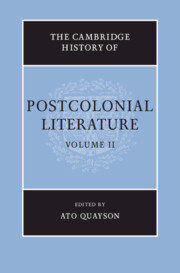Book contents
- Frontmatter
- 21 The language question in India and Africa
- 22 English and the development of postcolonial literature
- 23 Religion and postcolonial writing
- 24 Postcolonial responses to the Western canon
- 25 Island writing, Creole cultures
- 26 Magical realism
- 27 Palimpsest and hybridity in postcolonial writing
- 28 The narrative forms of postcolonial fiction
- 29 Poetry and postcolonialism
- 30 Primitivism and postcolonial literature
- 31 Popular culture and postcolonial literary production in Africa and India
- 32 Film and postcolonial writing
- 33 Fanon, Memmi, Glissant and postcolonial writing
- 34 Negritude and postcolonial literature
- 35 Publishing, prizes and postcolonial literary production
- 36 Key journals and organizations
- Bibliography
- Index
- References
34 - Negritude and postcolonial literature
Published online by Cambridge University Press: 28 January 2012
- Frontmatter
- 21 The language question in India and Africa
- 22 English and the development of postcolonial literature
- 23 Religion and postcolonial writing
- 24 Postcolonial responses to the Western canon
- 25 Island writing, Creole cultures
- 26 Magical realism
- 27 Palimpsest and hybridity in postcolonial writing
- 28 The narrative forms of postcolonial fiction
- 29 Poetry and postcolonialism
- 30 Primitivism and postcolonial literature
- 31 Popular culture and postcolonial literary production in Africa and India
- 32 Film and postcolonial writing
- 33 Fanon, Memmi, Glissant and postcolonial writing
- 34 Negritude and postcolonial literature
- 35 Publishing, prizes and postcolonial literary production
- 36 Key journals and organizations
- Bibliography
- Index
- References
Summary
Negritude can be defined as an aesthetic and literary movement that began in the 1930s. It centred on the creative and expressive potential of black consciousness, and through its transnational scope became one of the pre-emptive cultural phenomena of the twentieth century. Abiola Irele has proffered a comprehensive definition of Negritude as a ground-breaking literary and cultural phenomenon whose primary accomplishment was the validation and valorization of a wide-ranging black aesthetic. He writes,
In its immediate reference, Négritude refers to the literary and ideological movement of French-speaking black intellectuals, which took form as a distinctive and significant aspect of the comprehensive reaction of the black man to the colonial situation, a situation that was felt and perceived by black people in Africa and in the New World as a state of global subjection to the political, social and moral domination of the West.
Negritude was engendered and flourished in Paris in the mid 1930s, largely as a response to the implicit superiority of white colonizing cultures; it was led and fed by the writings of two black scholars from the French colonies, Aimé Césaire of Martinique and Léopold Sédar Senghor of Senegal. Both of these colonial subjects would go on to become major literary figures, and each would play a leading role in the political life of their respective countries of origin; Senghor became the first president of an independent Senegal, and Césaire served simultaneously as mayor of the Martiniquan capital, Fort-de-France, and as Martinique’s representative in the French National Assembly for over forty-five years.
- Type
- Chapter
- Information
- The Cambridge History of Postcolonial Literature , pp. 1100 - 1126Publisher: Cambridge University PressPrint publication year: 2012
References
- 1
- Cited by

